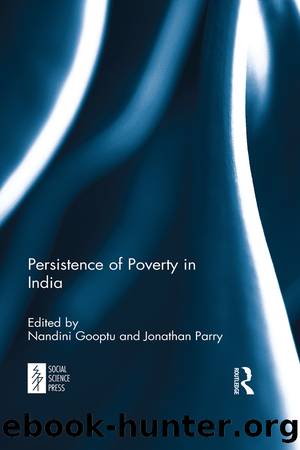Persistence of Poverty in India by Nandini Gooptu Jonathan Parry

Author:Nandini Gooptu, Jonathan Parry [Nandini Gooptu, Jonathan Parry]
Language: eng
Format: epub
ISBN: 9789383166046
Goodreads: 25320278
Publisher: Orient BlackSwan
Published: 2015-01-01T00:00:00+00:00
DISTANCE
The NREGS forms part of a history of pro-poor rhetoric in the state and in the locality, in village society, as well as a history of substantial and tangible pro-poor efforts on the part of the party-state. These substantial and tangible efforts include issues such as land rights for sharecroppers, subsidized loans for the poor, including the Scheduled Castes, protection against discrimination, and often active and forthcoming intervention on behalf of the poor by the state.5 These initiatives have done much to alleviate village poverty.
The recognition of these policies did not, however, prevent villagers in general from recognizing them also as politically motivated. It was to the electoral benefit of the CPM to ensure the support of the poor in general, but the support of those in favour of the party in particular. The pro-poor efforts tended to be lopsided, tilted towards expressed supporters. Benefits, intervention, and charity were given in exchange for manifest or tacit loyalty. Of course, it was always clear that the CPM also had to balance its pro-poor line against the interests of other important groups (Rogaly 1999).
Thus, in spite of the supplicant modality, there always remained a recognition of the political compulsions and logic of the moves and policies of the party. There was always a certain distance in how recipients talked about the party-state and its representatives (Ruud 2000), a distance not dissimilar to the individualâs ironic and humorous distancing in Achille Mbembeâs study, wherein laughter, joking, and perceptive appreciation of the hollowness of powerâs demand for respect constituted the ordinary personâs view of the powerful (Mbembe 2001).
But the distancing does not negate the sincerity with which the discourses are employed. The substantial and constitutive elements of a social contract in the discourse of the benevolent state, including the social contract of the party-state, are easily and constantly evoked. Elements of mutual obligation, protection, and care, in return for loyalty and support, are reminiscent of the rajdharma or kingly ideal that subjects employed to correct the ways of erring kings (Bhadra 1989). And the complex dependence and distancing reminds us of the powerful hierarchical notions held by workers in early twentieth-century Calcutta, in which âonly superiors can representââand yet superiors also had to conform to certain expectations (Chakrabarty 1989). It is this hierarchical construction of mutuality and obligation that we find employed by villagers in early 21st-century West Bengal as they talk about the opportunities that they have been awarded under the NREGS.
Download
This site does not store any files on its server. We only index and link to content provided by other sites. Please contact the content providers to delete copyright contents if any and email us, we'll remove relevant links or contents immediately.
Man-made Catastrophes and Risk Information Concealment by Dmitry Chernov & Didier Sornette(5981)
The Revenge of Geography: What the Map Tells Us About Coming Conflicts and the Battle Against Fate by Kaplan Robert D(4062)
Zero Waste Home by Bea Johnson(3821)
COSMOS by Carl Sagan(3606)
Good by S. Walden(3535)
In a Sunburned Country by Bill Bryson(3524)
The Fate of Rome: Climate, Disease, and the End of an Empire (The Princeton History of the Ancient World) by Kyle Harper(3046)
A Wilder Time by William E. Glassley(2846)
Camino Island by John Grisham(2787)
Organic Mushroom Farming and Mycoremediation by Tradd Cotter(2679)
The Ogre by Doug Scott(2669)
Human Dynamics Research in Smart and Connected Communities by Shih-Lung Shaw & Daniel Sui(2489)
Energy Myths and Realities by Vaclav Smil(2478)
The Traveler's Gift by Andy Andrews(2445)
9781803241661-PYTHON FOR ARCGIS PRO by Unknown(2354)
Inside the Middle East by Avi Melamed(2340)
Birds of New Guinea by Pratt Thane K.; Beehler Bruce M.; Anderton John C(2244)
A History of Warfare by John Keegan(2226)
And the Band Played On by Randy Shilts(2179)
